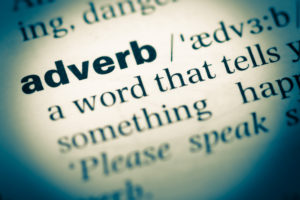Avoiding Adverbs
Adverbs are like sweets: they’re fine in small quantities, but large quantities can be very bad for you (and your writing). Oftentimes, adverbs are used by novice writers to avoid doing the real work behind crafting a captivating sentence. Because of this, novel critics and publishers may view an excess of adverbs as a lower quality of writing.

Now, we’re not saying you should never use adverbs in your writing. For example, in some cases, an adverb is the most concise way to phrase something. There are no good alternatives to words like daily or lovingly, so rephrasing them as “on a daily basis” or “in a loving manner” isn’t going to do your prose any favors.
However, the vast majority of adverb use comes across as simply lazy or redundant. The use of an adverb is redundant when it restates a characteristic already inherent in the word it modifies. For example, take the phrase, “He tiptoed quietly down the stairs.” The adverb quietly is modifying tiptoe, but the word tiptoe by definition means to walk quietly. You’ll want to avoid adverb redundancies like this in your writing.

Adverb use is viewed as simply lazy when it is used in place of writing a colorful, descriptive sentence. You’re using a single word to summarize something that could be fleshed out into more detailed prose. By using a single word, you’re oftentimes missing some character development opportunities.
For example, take the phrase, “She lightly knocked on the door.” There may be cases where this phrasing is acceptable if this is not a suspenseful or important moment in the story. But by using the adverb here, you’re missing the opportunity to create suspense and character development.

Take this phrasing instead, “She tapped on the door, just once. Though it was soft, in the silent hallway it was like a shockwave.” In this instance, we create suspense and character because we can actually feel that ‘she’ is nervous about whatever lies beyond this door.
An adverb should only be used as a last resort. There’s no need to remove it completely from your writing, but in cases where you notice redundancies or opportunities for better prose, cut it out. Experiment with your metaphors and similes, see what kind of imagery you can paint with these small moments. As a writer, think of it like you’re going on a no-adverb diet. You’re obviously going to cheat every once in a while (let’s face it, we all do). But if you’re making healthy choices the majority of the time, your writing will thank you for it.
